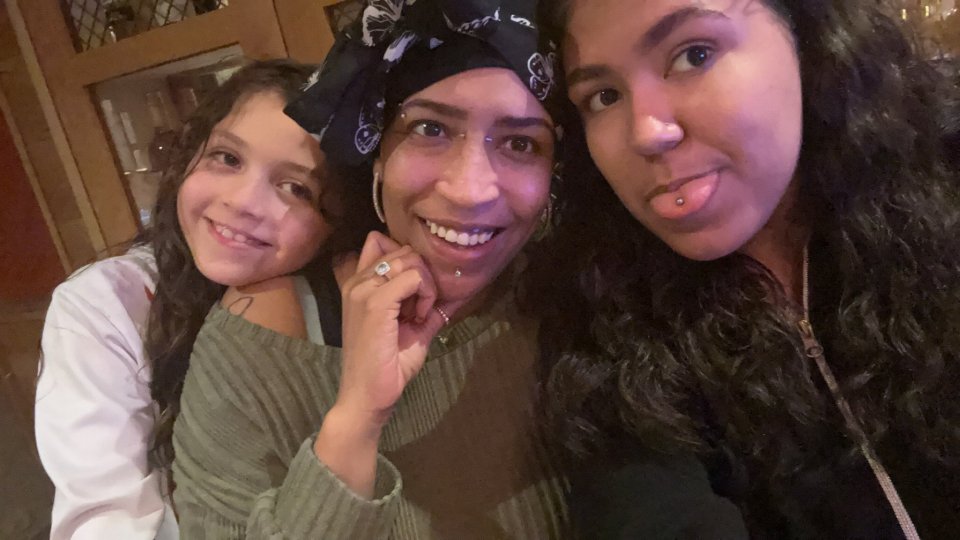WHEN Keshia Liburd visited the dentist with toothache she was told her teeth were in perfect condition.
But when the pain became worse and prompted an X-ray, the mum-of-three received the shocking news she had stage three lung cancer.
Back in 2023, the 38-year-old from Huddersfield, West Yorks. went to two different dentists complaining of severe toothache only to be told it was nothing to worry about due to the condition of her teeth.
It was only after the pain became too much that she finally visited A&E where she got an X-ray and was given morphine for the pain.
After being kept in for 16 days, the former smoker was given the shocking news that she had a rare form of stage 3 ‘ALK positive’ lung cancer.
Stage 3 ALK-positive lung cancer means the cancer has spread to nearby lymph nodes or chest structures and has a ALK mutation – a crucial piece of information for doctors as it guides treatment decisions.
There’s a variable outlook for patients with survival rates generally ranging from 13 per cent to 36 per cent for five years.
Speaking over messenger due to her condition, mum of three Keshia said: “I was in agony for weeks with toothache, I went to the dentist – I paid twice for a private dentist – and I was told there was nothing wrong.
“I got a pain in my chest, had an X-ray, and I was told I have pneumonia at first. Then, 16 days later was told I have cancer.”
Keshia underwent chemotherapy and radiotherapy, as well as hammer knife surgery.
After being told the cancer had gone in January 2024, the following April Keisha received the unfortunate news the cancer had come back, now stage four, and had spread to her lungs, liver, and brain.
Her cousin Kirsty Watson, 44, who spoke on Keshia’s behalf due to the difficulties speaking caused by her condition, said: “Physically, she’s struggling to get around the house – your breathing impacts everything, whether you can get up and make a cup of tea, what kind of quality time you have with your children.
“It’s impacting everything, really. Her memory has been impacted as well, because of the brain cancer.
“She’s forgetting quite a lot of things, general day-to-day things, which has an impact on the children as well, as they can see that.
“It’s like she’s deteriorated rapidly in front of her children’s eyes.”
Now, Keshia and her family are hoping to raise £40,000 to have advanced treatment – trans-arterial chemoembolisation (TACE) and dendritic cell therapy – with the NHS telling her they’ll offer no more treatment if her latest round of chemo doesn’t work.
According to Cancer Research UK, TACE is a form of chemotherapy injected directly in to the blood vessel which feeds a tumour to give a stronger dose of the drug, followed by a gel or tiny beads to block the blood supply.
The charity says dendritic cell vaccines are used to help the immune system recognise and attack cancer cells.
NHS England and the Calderdale and Huddersfield NHS Foundation Trust have been contacted for comment.
To donate to the family’s GoFundMe, click here.
Symptoms of lung cancer
Toothache isn’t a common direct symptom of lung cancer, but it can be related to the disease through referred pain.
The vagus nerve, which runs from the brain to various organs including the heart and lungs, means pain originating in the chest area can be felt in the jaw and teeth.
There are usually no signs or symptoms of lung cancer in the early stages.
Symptoms develop as the condition progresses.
The NHS says the main symptoms include:
- a cough that does not go away after three weeks
- a long-standing cough that gets worse
- chest infections that keep coming back
- coughing up blood
- an ache or pain when breathing or coughing
- persistent breathlessness
- persistent tiredness or lack of energy
- loss of appetite or unexplained weight loss
Less common symptoms of lung cancer include:
- changes in the appearance of your fingers, such as becoming more curved or their ends becoming larger (this is known as finger clubbing)
- difficulty swallowing (dysphagia) or pain when swallowing
- wheezing
- a hoarse voice
- swelling of your face or neck
- persistent chest or shoulder pain
If you experience any of these symptoms, see a GP.
What causes lung cancer?
Smoking
- Smoking cigarettes is the most significant risk factor, accounting for the majority of lung cancer cases.
- Tobacco smoke contains numerous toxic and carcinogenic (cancer-causing) substances.
- The more you smoke, the higher the risk.
- Even occasional or light smoking can increase the risk.
- Exposure to secondhand smoke also poses a risk.
- Other tobacco products like cigars and pipes also increase risk.
Environmental factors
Radon: This radioactive gas, often found in homes, is the second leading cause of lung cancer.
Asbestos: Exposure to asbestos, a mineral fibre used in building materials, significantly increases lung cancer risk.
Air pollution: Both outdoor and indoor air pollution, including particulate matter, are linked to lung cancer.
Workplace hazards: Exposure to certain chemicals and substances in some workplaces, like silica and diesel exhaust, can increase the risk.
Other risk factors:
Age: The risk of lung cancer increases with age.
Family history: Having a family history of lung cancer can increase your risk.
Previous lung conditions: Certain lung conditions like COPD, pneumonia, and tuberculosis can increase susceptibility to lung cancer.
Radiation therapy: Radiation therapy to the chest for other cancers can also increase the risk.















